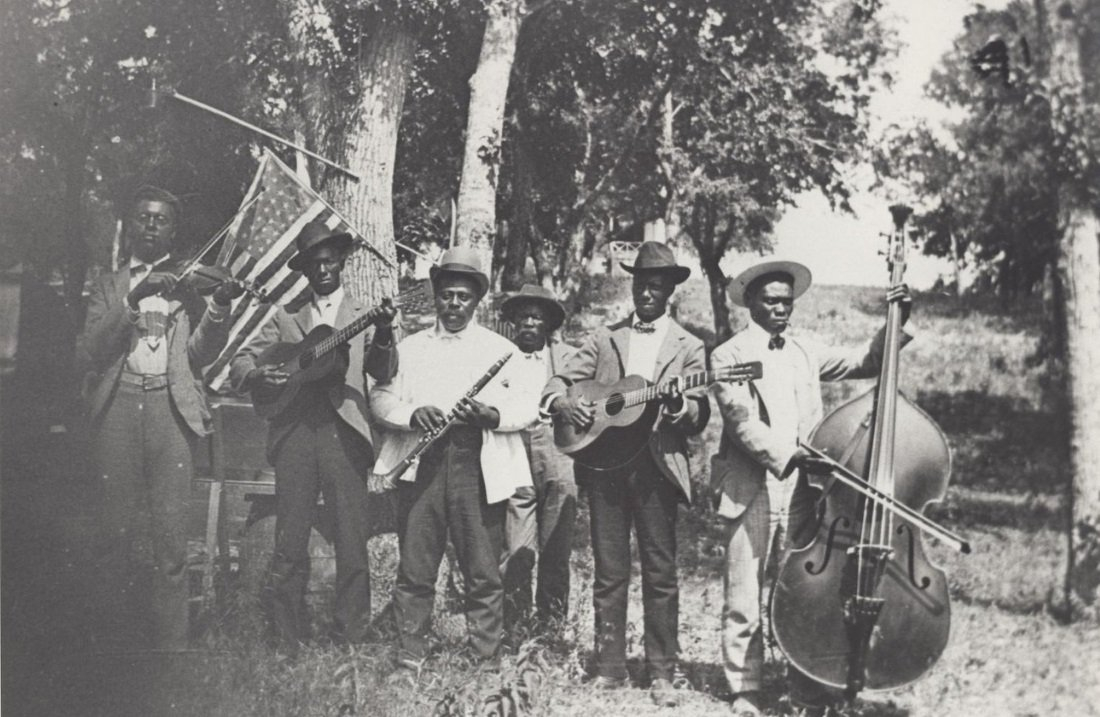What is Juneteenth? Why We Should All Know This Date
Lifestyle
|
Jun 19, 2020
|
2 MIN READ

You may be hearing a lot about Juneteenth, which is being celebrated today, June 19.
With national attention and conversation focusing on Black Lives Matter and systemic racism in the United States following the murders of George Floyd, Breonna Taylor and Ahmaud Arbery (three in a long list of other Black people who have been brutally killed) . Many are giving their employees the day off in hopes they "honor the historic pain caused by – and lives lost to – racial inequity and that they celebrate racial diversity," according to a memo issued by the CEO of J.C. Penney.
So what is Juneteenth exactly?

Juneteenth celebration in 1900 at Eastwoods Park. Credit: Austin History Center. Image source: Smithsonian
It's a day that commemorates the end of slavery in the United States, but not the day slavery actually ended. If you'd indulge us with a little history lesson: On June 19th, 1865, about two months after Confederate Gen. Robert E. Lee surrendered at Appomattox ending the Civil War, the Union Gen. Gordon Granger arrived in Galveston, Texas to inform enslaved African-Americans that the war had ended, and they were free.
The proclamation issued by Gen. Granger truly made real the Emancipation Proclamation, which had been given 2.5 years earlier by President Abraham Lincoln, on Jan. 1, 1863. So, it's important to note that June 19th, or Juneteenth, isn't the day enslaved people were freed or the day slavery ended. It's the day enslaved people in Texas were informed of their freedom – two and a half years after the Emancipation Proclamation.
And so while it isn't a nationally-declared holiday, it is a state holiday in Texas.
Can you imagine the shock and elation felt by the freed people in Texas when they heard this news? According to :
While [freed slaves] lingered to learn of this new employer to employee relationship, many left before these offers were completely off the lips of their former "masters" - attesting to the varying conditions of the plantations and realization of freedom. Even with nowhere to go, many felt that leaving the plantation would be their first grasp of freedom... the Juneteenth celebration was a time for reassuring each other, for praying and for gathering remaining family members. Juneteenth continued to be highly revered in Texas decades later, with many former slaves and descendants making an annual pilgrimage back to Galveston on this date.
Galveston remains the site of many Juneteenth celebrations, with parades, barbecues and musical performances that begin in the first week of June and draw about 10,000 people in total, according to this .
Keilani Abdullah, an adjunct professor of sociology at Raritan Valley Community College, shared on Facebook how although she is from Flint, Michigan, her heritage is Texas. "I was raised in a home, a family, that recognized Juneteenth throughout my life (welcome to the newcomers). My great grandparents, Van and Georgian Blueitt, found their piece of freedom on their homestead in the piney woods of east TX, along with all our peoples.
"We, their descendants, scattered across Texas ... and beyond ... have always carried this with us. Let the day remind you from whence you came, and where we have to go."
Another friend, who I know through social media and autism work, posted this status – author unknown – on Facebook:
"Days after the murder of Rayshard Brooks, weeks after the murder of George Floyd, months after the murders of Ahmaud Arbery and Breonna Taylor, almost 65 years since the murder of Emmett Till, and more than 400 years after the first Africans were enslaved on American soil, here we are still fighting for freedom. Here we are, free-ish.Racism isn’t new. It’s so American that when you protest racism, people often believe you’re protesting America. We’ve been called the N word. We’ve been called monkeys. We’ve been told to go back to Africa. Our humanity, our pain tolerance, our intelligence, have all been in question merely because of the amount of melanin in our skin. It’s a reality that Black Americans have learned to navigate. From childhood, we’ve seen the disparities in treatment, we’ve heard our parents explain what to do so we can make it home safely from a traffic stop. We’ve had those same conversations with our own children.We’ve learned how to code switch, to ensure we assimilate and conform to the corporate culture. We’ve learned to do what we can to not stick out too much, while trying to bring our whole selves to work. There’s been progress, and we’ve been told to be grateful for it, and to move on. But there are violent reminders on a regular basis that we’re still not free, only free-ish.I’m usually a very hopeful person, but there have been days that I’ve been overtaken by pain and anguish. Over these last few weeks, there have been days I struggled to get out of bed, days my eyelids were swollen from crying so much. Some days, it’s been hard to log on and stay on for the day.So, Juneteenth is different for me this year.I will give myself permission to not be ok. I will unplug to tend to myself and acknowledge how devastating these last few months have been. I will think of so many who lost their lives while simply being Black in America. But I will also give thanks to the leaders we stand on the shoulders of. I will grieve for the fight that remains ahead, and pray for the strength to endure that fight."
There's a lot for all of us to learn about the history of the United States, things we were not taught in school, . It's on us all to fill in the gaps, to catch up, to figure out how we can support each other in ways that don't fade away as the days and weeks pass.
Subscribe to be the first to know about new product releases, styling ideas and more.
What products are you interested in?

